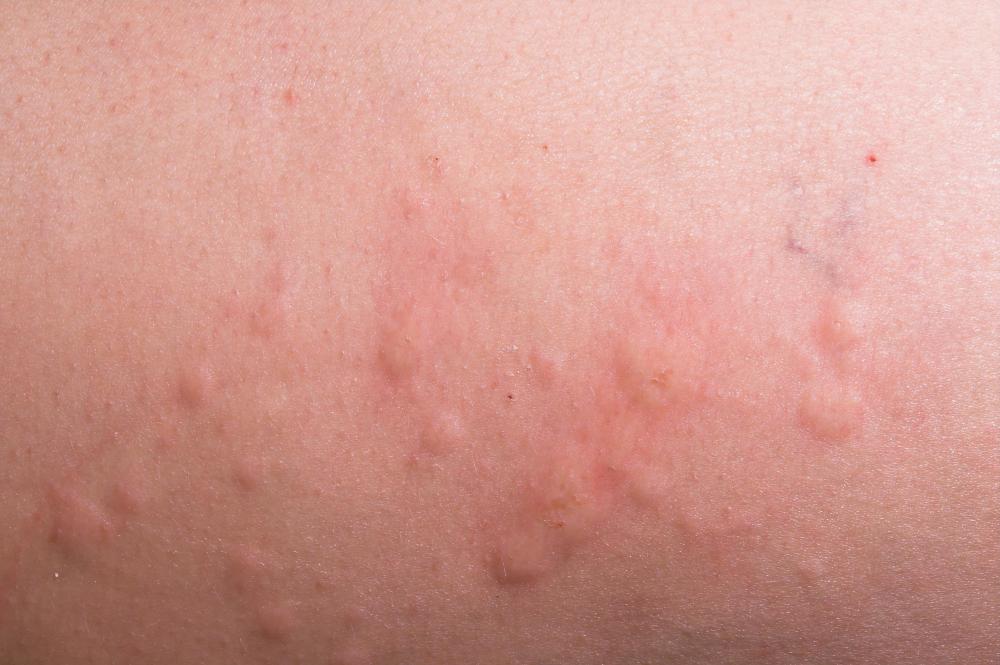At WiseGEEK, we're committed to delivering accurate, trustworthy information. Our expert-authored content is rigorously fact-checked and sourced from credible authorities. Discover how we uphold the highest standards in providing you with reliable knowledge.
What is Cold Urticaria?
Cold urticaria is a type of skin condition and is basically an allergy to cold temperatures. A person with this type of skin condition often breaks out into hives, a type of raised, red rash that tends to be extremely itchy, or in the most extreme cases the person may develop life-threatening complications. This reaction may occur any time that the person is exposed to cold weather or cold water. Some patients with cold urticaria cannot even drink cold liquids without having a physical reaction. The exact cause for cold urticaria is not fully understood, although it is believed to be associated with a faulty immune system.
Symptoms of cold urticaria typically occur within a few minutes of exposure to cold air or water. These symptoms may actually become worse as the skin begins to warm following this type of exposure. If the weather conditions are damp or windy, there is a greater chance of developing a reaction. While the appearance of hives, itching, and sometimes a painful, burning sensation are the primary symptoms of cold urticaria, some people may develop serious or even fatal complications.

In addition to the more typical symptoms of cold urticaria, some patients may experience rapid heartbeat, chills, or fainting. In some cases, various parts of the body may begin to swell, especially the arms, legs, or trunk. The greatest risk to the person with cold urticaria is to have full-body contact with the cold. Swimming in cold water is a prime example of this type of elevated risk.

Severe reactions may include a sudden and dramatic lowering of blood pressure. This sudden drop in blood pressure could cause fainting, or the person may go into shock. Shock is a medical condition in which the body is not receiving proper flow and can be life threatening. Symptoms of shock may include chest pain, confusion, or loss of consciousness. Emergency medical attention is essential if these symptoms develop.

Cold urticaria does not have a cure, but some medications may be able to help relieve some of the symptoms. Antihistamines are the most commonly used medications for this condition, and they can be quite effective at reducing itching and inflammation. Many antihistamines can be purchased without a prescription at most drug stores, although stronger antihistamines may be prescribed if the over-the-counter medications do not provide sufficient relief. Some types of anxiety medications may also relive symptoms in some people.
AS FEATURED ON:
AS FEATURED ON:













Discussion Comments
(This occurred at age 25) I hadn't even had any problems until I went on holiday and went for a swim in the sea. I got in the sea and immediately felt a little 'odd' , but ignored it. I got out of the sea about 30 minutes later and saw my whole body (not including head) was covered in hives. Now any type of cold water gives me hives, but it's worst when i have clothes on, getting caught in the rain for example.
@simrin-- I don't think that urticaria has anything to do with circulation. It's due to an immune system that doesn't function normally. It produces histamines as a reaction to cold and that leads to chronic hives. Unfortunately, the only treatment is antihistamines.
@burcidi-- I've had cold induced urticaria since I was a child but it seems to be getting worse as I get older.
I'm also on antihistamines, in addition to a medication that I take for circulation. My doctor thinks that I have a cold allergy, in addition to circulation problems. I've actually been doing slightly better since I was put on the circulation improving medication. It might be something to look into.
I developed this condition suddenly several years ago. I never had issues with cold before.
When I go out in the cold, I get an urticaria hives all over my body. I scratch for hours and sometimes damage my skin. I'm basically on antihistamine medications throughout winter and have to wear layers and cover up very well before going outside.
Does anyone else have cold urticaria? Did yours develop suddenly too?
Post your comments